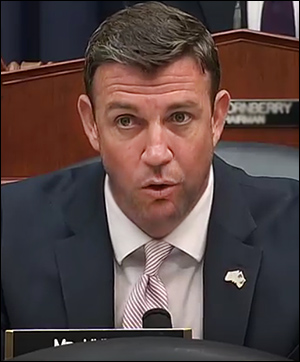By Jim Ellis
 April 2, 2020 — With the COVID-19 virus playing havoc with virtually every aspect of American life, including elections, how are the House vacant seats being affected?
April 2, 2020 — With the COVID-19 virus playing havoc with virtually every aspect of American life, including elections, how are the House vacant seats being affected?
North Carolina Rep. Mark Meadows (R-Skyland/Buncombe County) resigned from Congress Monday night to become White House Chief of Staff, which brings the total number of vacancies to a half-dozen. Special elections are scheduled in four of those, with three to be decided on or before May 12.
Originally, the special elections in Maryland and New York were supposed to be the first to go to the voters, but the COVID-19 precautions changed the date of the New York election and the voting system in Maryland. Former Rep. Kweisi Mfume, who easily won the crowded Democratic primary on Feb. 7, will win the special general on April 28 but the process now becomes all-mail. The Republican nominee is event planner Ken Klacik, but this Baltimore city district and surrounding area will easily remain in Democratic hands. We can expect Mfume to break 75 percent of the vote.
The former congressman was elected to five terms in the House beginning with the 1986 election. He resigned to become president and CEO of the NAACP in 1996. Mfume served in that position until running unsuccessfully for the Senate in 2006, losing the Democratic primary to then-congressman, Ben Cardin. Then-state Delegate Elijah Cummings replaced Mfume in the House at that time and served until his death in October. Now, ironically, Mfume returns to replace the late Rep. Cummings.
California’s 25th District, which begins in the state’s Simi Valley and stretches to the Palmdale area, potentially features the hottest of the current special elections. Rep. Katie Hill (D) resigned the seat because of a sexual scandal leading to a multi-candidate concurrent special and regular election.
Democratic state Assemblywoman Christy Smith topped the field on March 3, and she advances to the special election runoff on May 12 with Iraq War fighter pilot Mike Garcia (R). The latter individual placed ahead of, and eliminated, former US Rep. Steve Knight (R) who was attempting a political comeback after losing to Hill in 2018. Polling is projecting a tight finish. Regardless of what happens on May 12, both Smith and Garcia are advancing to the regular general election to battle for the full term beginning in 2021. The May 12 winner is immediately sworn into the House and serves the remaining part of the current congressional session.


